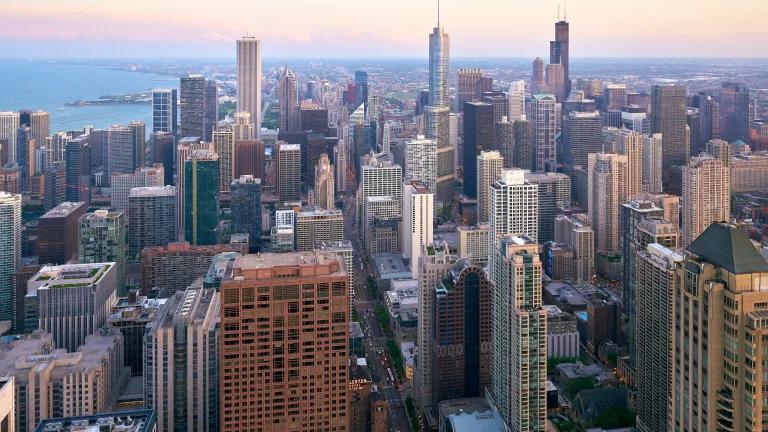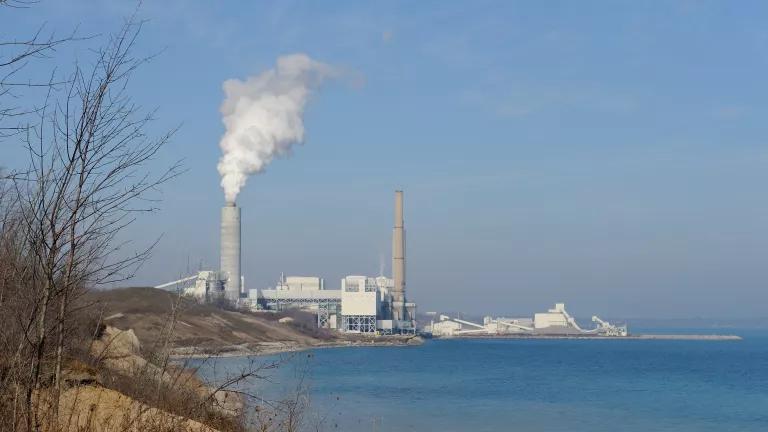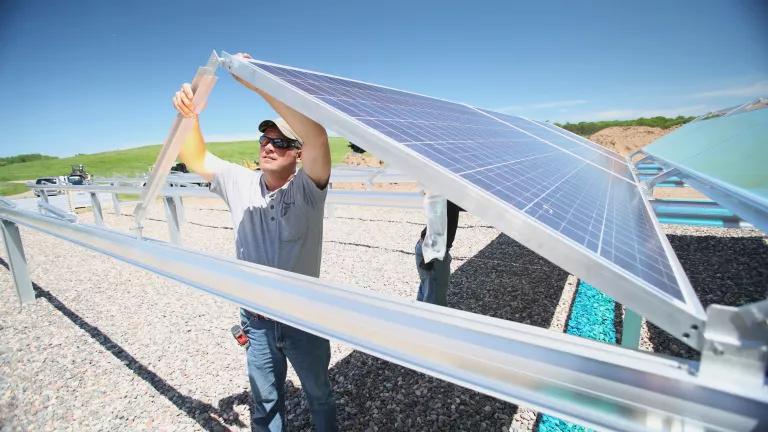Earlier this fall, a horizontal drilling permit was issued by the Illinois Department of Natural Resources to SM Energy, a company engaged in oil and natural gas development in North America. While SM Energy has stated that it does not intend to use high volume hydraulic fracturing, or “fracking,” nothing in the permit prevents the company from doing so. Coupled with ongoing reports by industry representatives of hydraulically fractured test wells being sunk in the southern region of the state, this permit makes clear that dangerous fracking is on Illinois’ doorstep – and the state is completely unprepared.
In light of these developments – the threats posed by fracking could not be more imminent, and the need for a statewide moratorium could not be more pressing.
Hydraulic fracturing, or, as it is more commonly known, “fracking,” is the practice of injecting large volumes of water, mixed with dangerous toxic chemicals and sand, deep underground at high-pressure to create fractures in layers of bedrock. In the case of Illinois, the fracking would be in rock known as shale. This process is used to extract what were previously considered inaccessible reserves of natural gas and oil. Illinois sits within the New Albany Shale, which is being targeted for oil and gas development.
Currently, Illinois has no safeguards in place to protect against the oil and gas industry running amok as the industry has done in the dozens of states that have fracking operations. As fracking expands across the nation, so does the potential for devastation to communities who must contend with polluted air, water and landscapes and plummeting property values. The devastation is not confined to any one state or region, and the oil and gas industry’s track record is far from stellar. What the industry has left in its wake are unaddressed concerns about the impacts of fracking on our health and the environment. The toll and the symptoms are almost too many to name, while the industry responses have been thin to nonexistent. The oil and gas industry plans to drill about a mile into the earth and up to two miles horizontally to access oil and gas. That is about as far apart as the oil and gas industry in Illinois is from common sense safeguards that NRDC, environmental groups across the state, and key agencies and decision makers have recommended the state adopt.
Specifically, NRDC along with many others, are recommending that the Illinois General Assembly pass comprehensive fracking legislation to require or ensure, among other things:
- A citizens right to take part in the process of permitting wells and appealing permits;
- Adequate disclosure of the toxic chemicals companies plan to pump underground;
- Testing and monitoring for contamination before and after fracking;
- Prohibition on the use of unnecessary toxic chemicals such as BTEX chemicals (benzene, toluene, ethylbenzene, and xylene), and a requirement that drillers prove for any toxic chemical that no safer alternatives exists;
- Tough standards for waste storage and disposal, and an end in Illinois to the loophole in federal law exempting drilling and fracking waste from being treated as hazardous – one of the many federal loopholes the oil and gas industry enjoys; and
- Measures to limit air pollution from both the fracking operations and the heavy truck traffic that accompanies it.
The oil and gas industry would recommend, well, quite frankly, that nothing be done – as demonstrated by industry representatives’ most recent actions. The industry is buying up land and permits in Illinois at breakneck pace so it can begin drilling here without concern or accountability for the full environmental and health impacts of its operations. Sure, the oil and gas industry has a plan for what it considers “acceptable” regulations, too, but its bar for “acceptable” is a pretty low one. None of the common sense protections listed above are part of industry’s proposal.
Illinois decision makers need to protect Illinois’ citizens, not the pockets of oil and gas interests. Illinois has a tremendous opportunity to lead the nation and get the rules right by developing responsible standards to govern fracking and by continuing to invest in clean energy, as we have done with energy efficiency and renewable energy – policies that have created thousands of jobs across the state. However, taking that opportunity to lead on fracking rules will require going beyond partisan divides and ideological rhetoric. It will require coming together to ensure no dangerous, “wild west” fracking happens on our watch. And we should do so, because if we do not act together to ensure that fracking is done responsibly if at all, we will end up facing a legacy of pollution together, with the taxpayers left to foot the bill for clean up.
Industry’s failure to work with environmentalists and community members in any meaningful way toward this goal, coupled with the imminent threat of fracking operations commencing, is why NRDC is calling on legislators to support a moratorium until the state has developed the kinds of protective standards that ensure safer practice. Until those much-needed robust standards are in place, Illinois must pass a moratorium in order to protect against the dangers of unregulated or deficiently regulated drilling devastating our communities. If you or someone you know live in Illinois, please contact your State Senate and House members now and ask that they commit to cosponsoring Senate Bill 3280 – a temporary moratorium on hydraulic fracturing.



